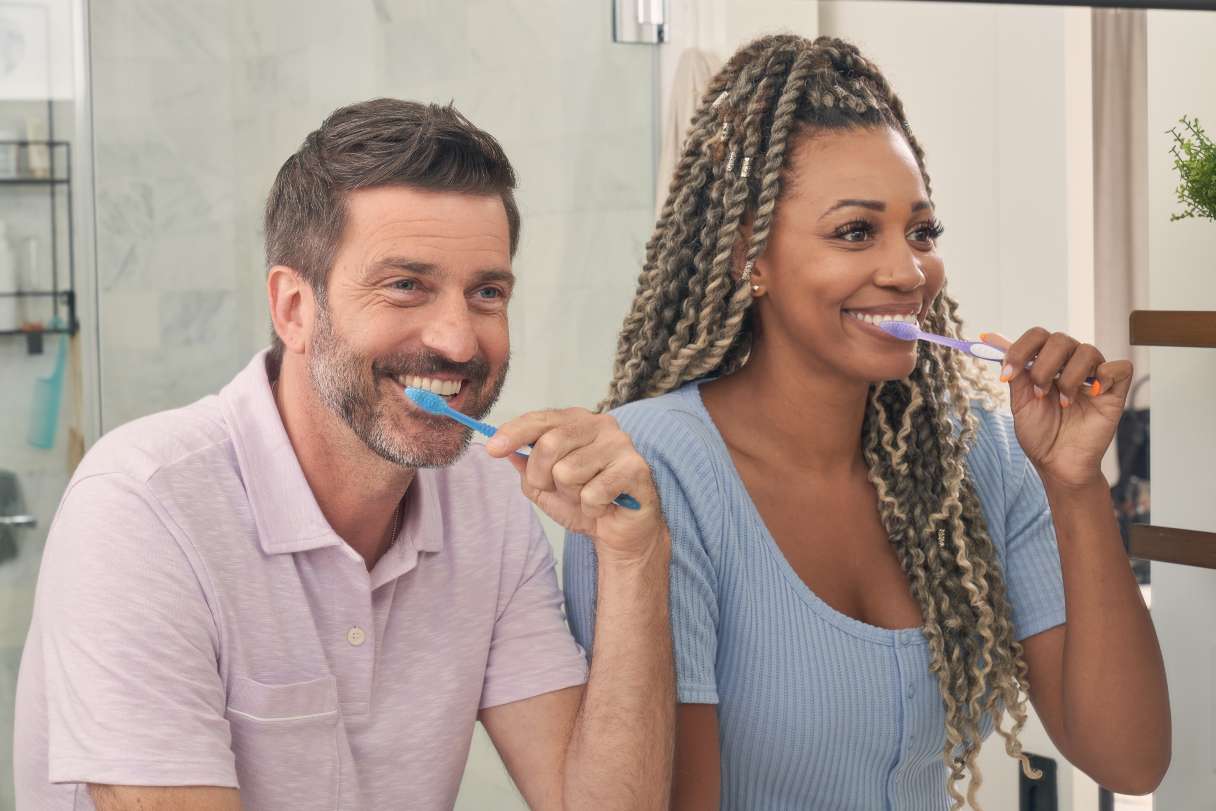Many of us have experienced bad breath at some point in our lives, either as the owner of the foul odor or the recipient who was downwind of someone else's bad breath. We're human — it happens!
Bad breath, also called halitosis, can range from a mildly annoying occurrence to a serious issue that needs to be addressed by a health professional.
Having bad breath can be embarrassing and impact social situations. If you're concerned about yours, we'll help you get to the root of the cause so you can start spreading those fresh breath vibes — stat!
1. Poor Oral Hygiene
The most common cause of bad breath is poor oral hygiene. If you're not keeping up with a regular brushing, flossing and mouthwash routine, it's easy for food to get stuck in the teeth and gums, leading to not only bad breath but also bigger dental problems like bacteria growth and gum disease.
Here's what a proper oral hygiene practice looks like:
- Floss at least once daily to remove food from your teeth.
- Brush twice a day for at least two minutes each time with a soft-bristled brush. Hold your brush at a 45-degree angle.
- Use a tongue scraper to remove bacteria from your tongue. Tongue biofilm can be a source of stinky bacteria and plaque. You could also use your toothbrush to brush your tongue, but a tongue scraper is likely to do a better job of removing this film.
- Rinse with 15 ml of an alcohol-free antibacterial mouthwash for at least 30 to 60 seconds. Swish it all around your teeth and gargle with it so it reaches the back of your tongue and throat. You can use it after you brush but also after you eat to help freshen your breath.
Brushing and flossing properly helps remove plaque, a film that builds up on your teeth after eating and drinking things other than water. If the plaque isn't taken care of, it can turn into gingivitis, a common dental problem of an inflammation of the gums that leads to swollen, red and bleeding gums. Gingivitis can cause bad breath, too.
If you wear removable dentures, clean them properly at night by taking them out and cleaning them well before putting them back in the next morning.
Improving your oral hygiene should be one of your first lines of defense when it comes to addressing bad breath.
2. Dietary Factors That Cause Bad Breath
If you've ever eaten a meal that contained onions or garlic, you may have had stinky breath that lasted for hours — even after you brushed your teeth! That's because these two foods are higher in sulfur, which emits the characteristic odor that lingers for a long time after your body has broken them down.
For many of these foods that cause bad breath, after the components of these foods are digested and enter your bloodstream, they are carried to your lungs and wreak havoc on your breath. Other foods and beverages that cause stinky breath include:
- Pickles, pickled foods and spices
- Fish and fish products can also make your mouth smell, well, fishy
- Coffee and alcoholic beverages
In order to reduce food and beverage causes of bad breath, it's best to limit them in your diet and to set aside time to brush and rinse with mouthwash after consuming them to ensure you're removing any stubborn food particles from your teeth.
Some foods that can help counteract bad breath include:
- Herbs: mint, parsley, basil
- Fruit: citrus, melon, berries
- Crunchy fruits and vegetables: apples, carrots, celery
- Green tea
People who are following the ketogenic diet will probably notice a change for the worse in their breath as their bodies get into fat-burning mode.
3. Dry Mouth Can Cause Halitosis
Not drinking enough water to stay hydrated throughout the day can also cause bad breath. When your mouth and tongue are dry and you aren't producing enough saliva, you're more likely to have an unpleasant odor emit from your mouth.
Dry mouth can also be due to a number of factors:
- Smoking
- Medications (over-the-counter and prescriptions)
- Alcohol
- Coffee or caffeinated products
Thankfully, there are multiple ways to counteract dry mouth, such as:
- Drinking water after meals to help rinse out the mouth
- Drinking water in between and after drinking alcohol and caffeinated drinks to hydrate
- Eating sugar-free mints or candies, or crunchy fruits and vegetables to boost saliva production in the mouth
- Talking to your dentist about dental hygiene products that can help with dry mouth
- Avoiding tobacco products, caffeine and alcohol to reduce dry mouth symptoms
4. Certain Medical Conditions Can Cause Bad Breath
A number of health problems and medical conditions can cause dry mouth and/or make your body release an unpleasant scent from the mouth.
Here are a few to talk to your doctor about:
Sinus conditions and infections
A postnasal drip that's due to a temporary or chronic infection can cause bad breath due to dry mouth or bacteria that produce odor. If the bad breath is due to an infection, once the infection is gone and you're feeling better, the bad breath symptom should disappear as well.
Periodontal disease
Untreated gingivitis can lead to periodontal disease. This mouth disease is due to bacteria and tartar buildup that causes the gums to swell. Progressive periodontal disease can cause bad breath.
Gastric reflux
Gastroesophageal reflux disease (GERD) is a digestive disorder that leaks acid back into the esophagus, which can cause bad breath.
Diabetes
People who have diabetes are at an increased risk of gum disease, which can contribute to bad breath problems.
Liver or kidney disease
People who have liver or kidney diseases aren't filtering out toxins properly and their breath pays the price. If the breath has an ammonia-like odor, it could be a sign of chronic kidney failure.
If you suspect your bad breath is due to dry mouth that's related to a cold, sinus infection or allergies, you can probably remedy the rank breath situation by stepping up your dental hygiene, staying hydrated and possibly stopping OTC medications that are causing the dry mouth/bad breath.
Suspect that it's something more serious? Make an appointment with your healthcare practitioner and share all of your symptoms, including the breath issue. They might run tests to rule out serious medical conditions and help get to the bottom of your halitosis.
5. Lifestyle Factors That Contribute to Bad Breath
Could your vice be the reason you're experiencing bad breath? If it's tobacco or alcohol many signs point to “yes!"
Using tobacco products
You're probably aware that smoking leads to mouth odor after you're done smoking a cigarette, but if you use chewing tobacco, that could also be the cause of bad breath. While rinsing your mouth with water and chewing sugar-free gum or mints can temporarily help, quitting smoking and chewing tobacco will be the best long-lasting action item to kick bad breath for good.
Drinking alcohol
Ever experience someone emitting alcohol from their breath the next day after they've been drinking the night before? That alcohol breath can linger for a long time after you're done drinking. Make sure you brush, floss and rinse well with mouthwash after drinking alcohol — and do it again the next day. Drinking less or abstaining from alcohol can help with this bad breath issue.
6. Medications That Cause Bad Breath
Certain medications can cause bad breath due to the possibility of dry mouth or the release of chemicals on your breath as they are broken down in the body. Here are some to be aware of and talk to your physician about if you suspect your prescription or over-the-counter medicine is the root cause of your malodorous problems.
Acetaminophen
This OTC pain medicine might be the reason your breath smells. If you suspect it is the culprit, talk to your physician about alternatives.
Allergy medications
Allergy medications that contain antihistamines and/or decongestants can cause bad breath due to them causing a "dry mouth."
Antidepressants
Certain antidepressants can cause dry mouth as a side effect which can lead to bad breath.
If you or your healthcare provider suspects your medications may be the reason your breath smells, they can talk to you about changing the dosage or possibly switching medications.
How to Get Rid of Bad Breath
Good oral hygiene is the foundation for fixing bad breath. Make sure you're taking enough time to focus on your oral health twice a day by brushing for two minutes with fluoride toothpaste, flossing daily, removing plaque from your tongue and rinsing for at least 30 seconds with mouthwash.
Make sure you're visiting your dentist for a professional dental cleaning every six months. Address any bad breath concerns with them during the visit — chances are, they've seen, heard and smelled it all!
Your dentist might prescribe OTC or prescription medications that can help with bad breath. They can let you know if your bad breath is due to gingivitis or periodontal disease and if you'll need to visit a periodontist to address your gum health.
Dental Financing With the CareCredit Credit Card
Regular dental checkups are important to help prevent, identify and treat dental problems before they become more advanced. The CareCredit credit card can help you pay for dental exams, cosmetic dental procedures and other costs that insurance doesn't cover — to help you keep your pearly whites bright and healthy.* Use our Acceptance Locator to find a dentist near you that accepts CareCredit. Make the most of your wellness journey by downloading the CareCredit Mobile App. You can find a provider on the go, manage your CareCredit account and easily access the Well U blog for more great articles, podcasts and videos.
In addition to dental care, you can also use your CareCredit credit card for pet care, cosmetic, vision, hearing, health systems, dermatology, pharmacy purchases, spa treatments and so much more within the CareCredit network. How will you invest in your health and wellness next?
Expert Reviewer
Dr. Howard Ong, M.A.G.D.
Dr. Howard Ong, M.A.G.D., is a general dentist who specializes in dental implants and is one of the partners and owners of Oaxaca, Ong & Jensen Seal Beach DDS, located in Seal Beach, California. Due to his extensive training, he handles all surgery cases for the practice and is a proponent of using cutting-edge technology in the office.
Author Bio
Diana Kelly Levey is a freelance journalist, content marketing writer, and author with more than 15 years of experience covering health and wellness.









